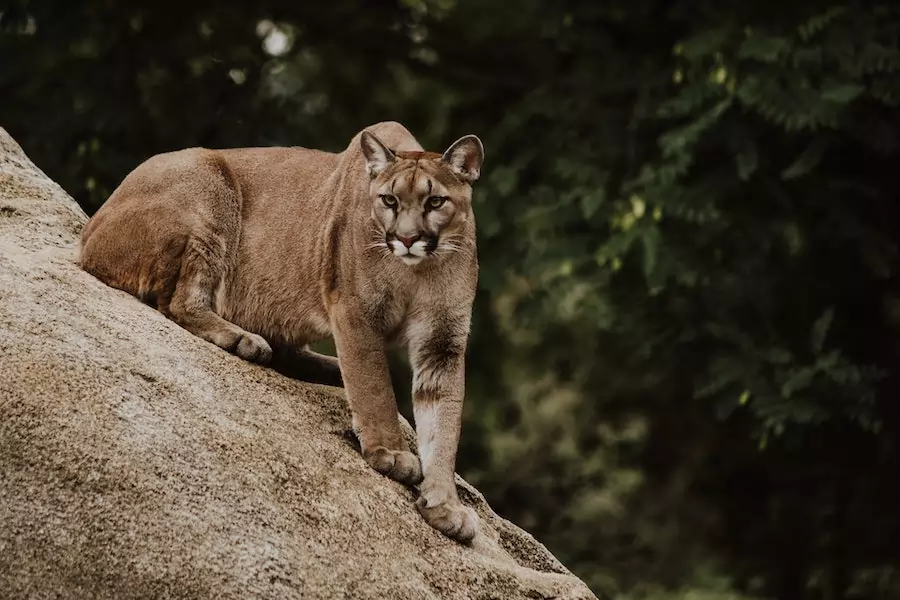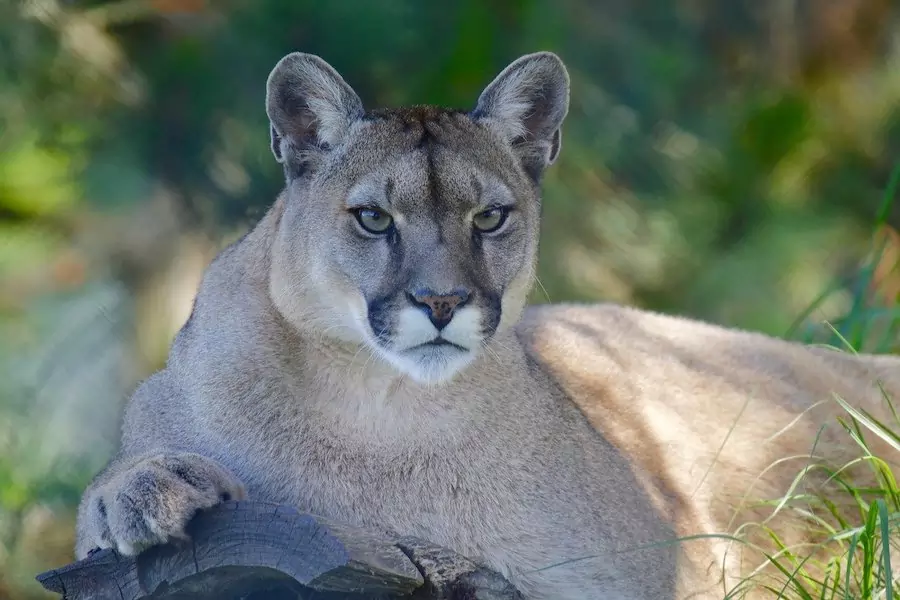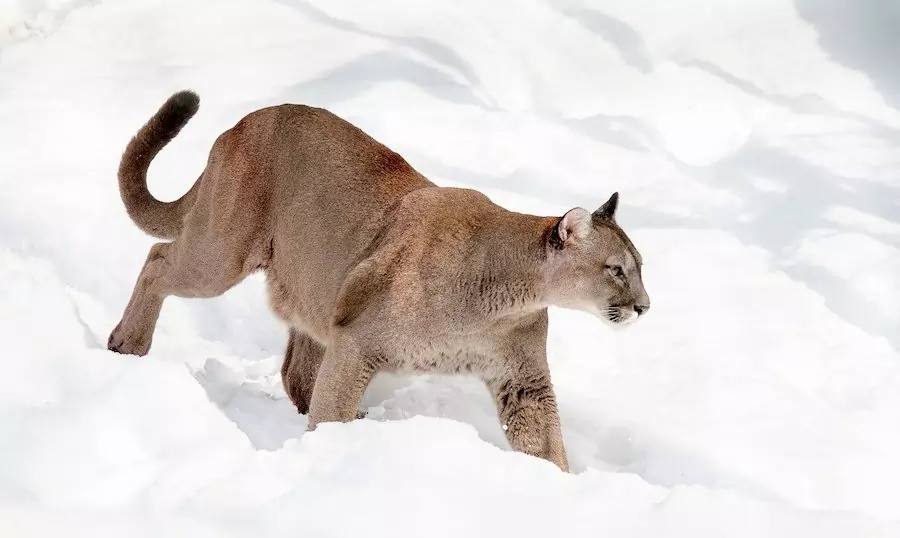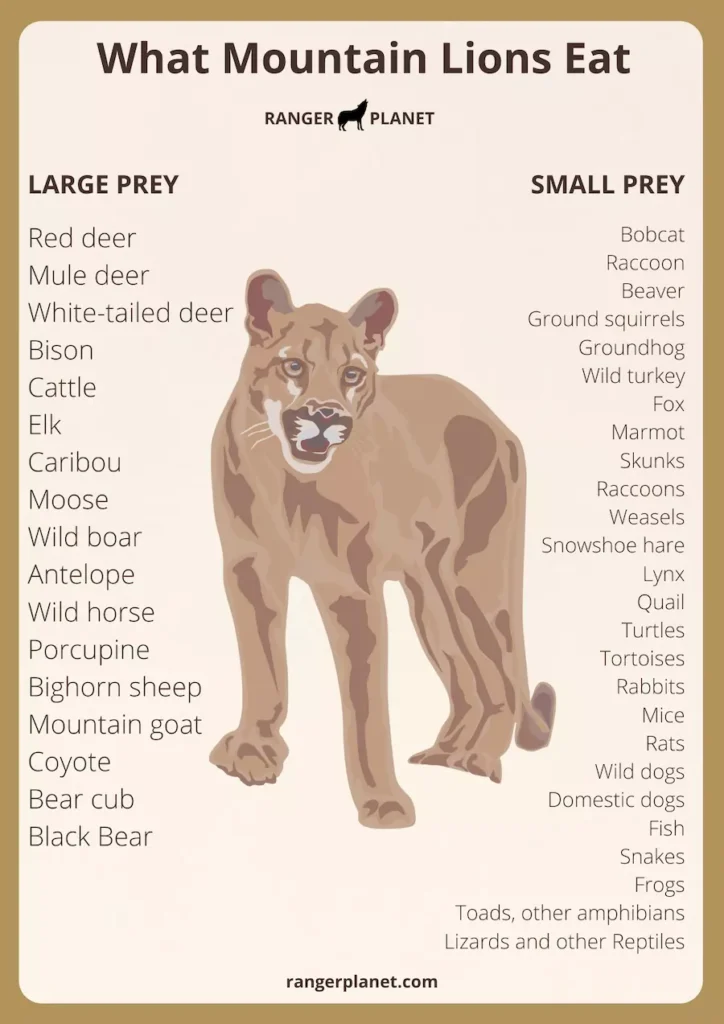In this article, we’re going through the list of what mountain lions eat in their habitat. listed by what they eat and what time of year. So, what do mountain lions eat?
The mountain lion is also known as the cougar, puma, panther, or catamount among other numerous names.
Generally speaking, mountain lions can be found wherever deer are present. Their usual habitat is steep, rocky canyons or mountainous terrain. Mountain lions can be found in deserts as well as coastal forests, and from sea level up to 10,000-foot elevations
It’s a large animal from the cat family, an obligate carnivore and opportunistic hunter, that feeds on what it can find in its habitat. These include deer, elk, wild pigs, and rabbits to name a few.
They will typically feed on what they find first, what’s available at the time. If what they can find isn’t sufficient food to sustain them, they’ll go on a hunting spree for a larger animal or other smaller prey.
An adult mountain lion typically eats 8 to 10 pounds of meat per day.
Read on, or watch the video below from our Ranger Planet YouTube channel.
If you’re wondering what lions eat in general, then here’s an article on what lions eat. We also answer the question of do lions eat other lions.
What do mountain lions eat
Mountain lions will hunt both small and large animals in the wild. This includes many animals that inhabit the same areas as the mountain lion.
The most common mountain lion prey is deer, elk, and even smaller animals like foxes or coyotes.
Mountain lions will also hunt bovine when available.
But their natural diet will also include a wide variety of other smaller animals, such as rabbit, turkey, raccoon, and squirrel.
Here’s the complete list, starting with the larger animals that mountain lions eat.
17 Larger animals that mountain lions eat
- Red deer
- Mule deer
- White-tailed deer
- Bison
- Cattle
- Elk
- Caribou
- Moose (young or infirm)
- Wild boar
- Antelope
- Wild horse
- Porcupine
- Bighorn sheep
- Mountain goat
- Coyote
- Bear cub
- Black Bear
Because of their size, mountain lions can’t viably hunt larger animals on a regular basis, what it does instead is look to hunt mainly smaller to medium-sized prey.
Below is a list of typical smaller animals that mountain lions would hunt and eat.
26 Smaller animals that mountain lions eat
- Bobcat
- Raccoon
- Beaver
- Ground squirrels
- Groundhog
- Wild turkey
- Fox
- Marmot
- Skunks
- Raccoons
- Weasels
- Rabbit
- Snowshoe hare
- Lynx
- Quail
- Turtles
- Tortoises
- Wild dogs
- Domestic dogs
- Fish
- Frogs
- Toads, other amphibians
- Snakes
- Lizards and other Reptiles
- Mice
- Rats

What birds do mountain lions eat?
Mountain lions certainly include ground birds like quail and wild turkey in their diet. But have less opportunity to eat other birds. If they can surprise a bird that is on the ground or within reach then they may consider it. These include Hawks, Great horned owls, and waterfowl such as ducks.
Mountain lion prey availability
Prey availability determines what an individual mountain lion can feasibly find to eat.
Aside from location, this is often dictated by the seasons. Hunting down prey that is hibernating is harder than hunting them out in the open during the spring or summer.
Mountain lion diet during times of scarcity
When food is scarce, they might resort to hunting smaller species of prey, which might not be enough to satisfy their hunger.
In order to overcome the challenge of quantity, mountain lions will hunt a variety of small prey at once. This provides them with a healthy meal – without compromising on their regular diet.
Fruits and vegetation
Mountain lions are predominantly carnivores, but vegetation also makes up the other parts of what mountain lions eat during certain seasons in which other types of meat are scarce or less available.
These include vegetation such as:
- Berries
- Nuts
- Leaves
- Fruits
- Roots.
Mountain lions adapt their diet depending on what is available to them where they are at the time.
They will usually find what they need to stay alive, even if this means hunting outside their regular prey circle or territory. They have even been known to attack and eat small alligators.

Do mountain lions eat snakes?
Yes. Mountain lions will prey on snakes they know not to be venomous as an opportunistic meal. They may eat the entire snake as well as what is inside of it (such as eggs, mice, or other recent food). Grass snakes and other regular snakes can be relatively easy prey for a mountain lion.
Do mountain lions eat reptiles?
When it comes to reptiles, mountain lions will eat what they can catch, which is often lizards and small snakes. They will also eat what is abundant in their region, sometimes turtles or tortoises.
Do mountain lions eat dead animals?
Yes. Mountain lions are carnivores, which means they eat meat. They will eat carrion (decaying meat) if it is readily available because mountain lions eat to survive.
Mountain lion diets vary across regions
Mountain lion’s diets vary depending on what type of terrain the mountain lion inhabits and what prey species are available. For example, mountain lions who live in coastal areas will perhaps eat more deer, while mountain lions who live in the Rocky Mountains will eat more elk.
Mountain lions from the desert areas of Arizona and California eat a lot of small mammals such as rabbits and rodents.
The western united states have a higher population of mule deer, so this would be more prominent in a mountain lion’s diet of that area.
What mountain lions eat during the seasons
Availability of prey plays an important role in what and when mountain lions can potentially hunt and eat.
Winter and Fall
In the winter, mountain lions eat what is available and what they can get. What is available to them in the winter depends on what part of North America they live in, what times of the year it is, and what their prey species do regarding hibernation, breeding, migration, etc.

Spring and Summer
Food is far more abundant in the warmer months and those months when breeding occurs.
For example, in the spring and onwards, when deer give birth to fawns, there is an abundance of prey that is within reach for a mountain lion’s stealthy approach. This continues through the summer months.
When do mountain lions hunt?
Mountain lions typically hunt during the night and dawn hours which makes them crepuscular most of the time. But like domestic cats, they can be Cathemeral.
Mountain lions hunting abilities
They have keen night vision and can see very well in dark and low light settings. Hunting at night enables them to better ambush their prey.
Mountain lions have a very strong sense of smell and can detect prey from a mile away.
They also have ultrasonic hearing which enables them to hear the sounds of prey that are far away or below ground level.
They’re also good swimmers which enables them to hunt prey in shallow waters.
This makes predation easier because they don’t have to expend as much energy looking for their food.
What do mountain lions not eat?
While they may sometimes resort to eating vegetation, mountain lions are referred to as “obligate carnivores”, because they are instinctively driven to eat meat.
However, like most predators, they will not hunt what they cannot feasibly bring down without risk of injury during the encounter.
Any injury can be fatal, so unless the mountain lion is desperate, it’s often better to wait until easier prey comes along.
What do mountain lions eat – more help
We hope this provides an answer to the question of what do mountain lions eat. Be sure to check out other articles on Ranger Planet and you can also check out our YouTube Channel where we’re adding new content all the time.
And here’s a shareable list of what a mountain lion eats.

